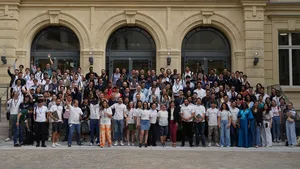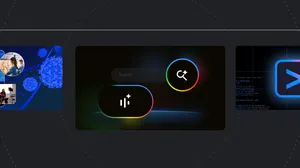Mental health trends & how they affect communities of color

Editor’s note: July is Bebe Moore Campbell National Minority Mental Health Awareness Month. To bring awareness to mental health, Asad Abdullah II — a Google engineer, trauma-informed meditation instructor and mental health advocate — chatted with licensed psychologist Dr. Ghynecee Temple about mental health trends, how they affect communities of color and ways to cope.
Search interest for anxiety reached a record high across the U.S. this year. As we begin to reintegrate into life after an extended period of social distancing and self-isolation, people across the country are looking for ways to cope.
Marginalized communities in particular have been disproportionately affected and continue to face challenges and stigmas when it comes to accessing resources and talking openly about mental wellbeing. According to Mental Health First Aid, 48% of White Americans with mental illness received mental health services, compared to 31% of Black Americans and Latino/Hispanic Americans and 22% of AAPI populations.
Curious to talk more about the mental health trends we’re seeing for marginalized groups, I sat down with Dr. Ghynecee Temple of the Ladipo Group, a Black-owned company dedicated to the emotional wellness of Black and African-American people and communities. Dr. Temple sifted through these trends, discussed lingering mental health stigmas and shared ways we can take care of our wellbeing and support others.
Search interest for “why do I feel anxious for no reason” spiked 400% in 2021 U.S. compared to 2020. How is this affecting communities of color specifically?
There's always a reason you feel anxious, you just may not have uncovered it yet. For communities of color, both before and during the pandemic, there are unique experiences that affect their mental wellbeing. You may deal with navigating daily discrimination, feel a lack of autonomy being in a system that suppresses or grapple with intersecting identities.
Fast forward to COVID-19, and you have a massive loss of control. You can’t see, smell or touch it, but it’s ever-looming and ever-present. So of course you’re going to feel anxious.
Still in some communities, getting mental health help is stigmatized. What I tell people is: Your brain is your control center for your entire body. If your thoughts are off, it's going to impact every facet of your functioning. And if something is off and not feeling right, why wouldn't we get help?
As people prepare to return to work and school, what would you say to those who are experiencing uneasiness or anxiety?
Your feelings about the transition are valid. Some people are excited to socialize again, others are relieved as home may not always be the safest place for them, and still others are nervous about interacting with people outside of their bubble. Don’t judge your feelings, and accept that you’re going to experience different moods each day.
What are some practical steps we can take to manage those feelings?
There’s still a lot of uncertainty, but part of what we can do to weather that storm is to be present. Instead of thinking about what’s happening in two months or 12 months, ask yourself how you are feeling right now and what you need at this moment. Set boundaries and goals for yourself. For example, if you feel safer wearing a mask, continue to do so even if it’s not required. If you’re struggling with social anxiety, set a goal to socialize for 15 minutes at lunch before allowing yourself to go back to your desk to decompress. Exposure is one of the most helpful things to improve social anxiety. Start small and challenge yourself to build upon it every day.
A lot of people are turning to therapy, and search interest for “black therapists” spiked last summer. How can people within the BIPOC community go about finding a therapist?
A quick Google search will show you resources near you — and even a self-assessment to help you learn more about anxiety. When finding a therapist, many therapists will have an online bio where they can talk about their own identities that feel salient or what communities they’ve worked with before — start there. Then ask for a consultation and evaluate them for yourself. I love when new clients ask me questions! You don’t have to pick the first therapist you find. Remember that you’re shopping and want to feel comfortable and safe.
I’m a Blue Dot Listener at Google. Our aim is to de-stigmatize mental health conversations in the workplace through allyship, peer support and education. I’d love to know from you, how we can be better mental health allies at work?
As allies, we need to check our own beliefs and biases, and embrace a continuous posture of learning and unlearning. I’d also encourage people to know their limits. There are often instances where we try to support people, but it’s out of our scope. Know when to connect people to the right resources.
You’ve been in the mental health space for almost a decade, what makes you hopeful for mental wellbeing for historically underrepresented groups?
The fact that people are even searching for mental health topics is encouraging. It makes me hopeful that people are willing to learn and unlearn things.






